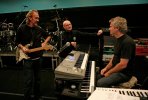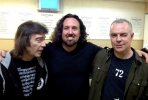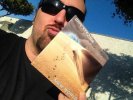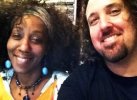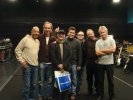“In conversation” - Dave Kerzner talks to andrew head
about his career. Photographs: Lee Millward, Dave Kerzner and Sylvia Pistel.
AH: first some background. What was your upbringing and early music
career like?
DK: I got my start in the 1990’s doing session work as a keyboard player
and sound programmer in LA with various artists like L Shankar whom I toured
with on Peter Gabriel’s WOMAD Festival in 1993. This was after working
on an album with him that had guests like Phil Collins, Bono and The Edge. I
also played with Kevin Gilbert’s bands, Thud and Giraffe. With Giraffe
we performed songs from The Lamb Lies Down On Broadway at Progfest in 1994.
With Thud we performed songs from Kevin’s album Thud and there’s
a DVD called Kevin Gilbert Thud Live At The Troubadour that documents that era.
I also did sound programming work with artists like Crowded House, Madonna,
Smashing Pumpkins and Barbara Streisand . Then in 1996 I started my sound development
company “Sonic Reality”.
AH: What would you tell a younger version of yourself?
DK: I’d say ‘woah! How did you get here younger version of me?
This is trippy!” and then I’d say: ‘Well, since you’re
here young squids, I’d like to tell you that you CAN sing so don’t
just sit behind those keyboards and think that you have to depend on anyone
else to make a record”.
AH: What excites you most, writing or performing?
DK: I love it all. Technically performing is more exciting than recording because
it’s in the moment and you’re sharing a part of yourself with an
audience which responds back. However, writing music captures certain emotions,
moods, melodies, concepts, poetry and other creative elements into a piece of
work that transcends time and space. A song can live on past the writer and
reach people even when you’re not physically there. It’s really
a privilege to be able to do that. So it is hard to pick one between the two
but, if I had to choose, I’d be a writer over a performer.
AH: What is your inspiration when writing music?
DK: It varies from song to song. It usually starts from sitting down at the
piano or guitar and playing whatever I feel in that moment. Most of the time
I’m not even doing it with the intention of writing anything, I’m
just playing for my own enjoyment and to sort of exercise the fingers. Then,
as I’m improvising, if something catches my ear and appeals to me or sparks
some ideas, I will record it really quick. Sometimes I will go back to it later
and sometimes I will start writing a song on the spot based on how it feels
and what it seems to say. I ask myself “what is the music a soundtrack
to in terms of a human story?” the story can be based on emotions I am
feeling at that moment or from reflecting on my own past or on other peoples’
experiences or complete fiction. But there is always a connection between the
musical vibe and mood with the lyrical content as if the music was the appropriate
soundtrack to what the visual the words convey.
AH: Where did the idea for your new album come from?
DK: The original title for the new album was going to be Static and there’s
actually a song called Static that I recorded with Nick Mason on drums, Colin
Edwin on bass, Fernando on guitar and myself singing and playing keyboards.
It’s a cool sort of Floyd-y song but it needed more work and I decided
to postpone finishing it until after the album. I might release it as a bonus
track with the Pink Floyd tribute that I am producing which is based around
Nick Mason’s drums and the Alan Parsons Sample Project, two sound library
products I did with Sonic Reality.
The reason I switched the title to New World was because of the song that came
first. After that song was written I realised the album had to be called that
because of its multiple meanings. I’ll tell you how that came about because
it was unusual. I was running out of the door when I was humming the melody
of the song in my head before I had written it. I thought I had better record
it real quick before I go out. But I ended up fleshing out the whole song on
the spot. It is clearly very John Lennon and The Beatles influenced stylistically.
Lyrically I had been very inspired by Eckhart Tolle’s book A New Earth
which Francis Dunnery had bought for me in audio format and I used to talk almost
daily about philosophy and all sorts of deep stuff. When I showed him the song
I had written, he absolutely loved it and thought that I had done a good job
at putting that kind of message into a song that could potentially reach a wide
audience with a very powerful message. That message is that we can create out
own reality.
He had a song called My Own Reality, which is one of my favourites of his,
that has a similar message but it is conveyed in a esoteric way. Anyway, once
I had that song and some of the others, I realised the potential for a concept
album where the main character had to survive and make his way home. In the
process he would be overcoming a certain “victim mentality” that
so many of us take versus taking charge of things with the knowledge that we
are the masters of our own destiny and at minimum we play a huge part in the
manifestation of our reality in the present moment and we pave the way for our
future through the law of attraction.
AH: Have you had any “I need to pinch myself” moments (laughs)
and what were they?
DK: Sitting in on the Genesis rehearsals in 2006 was definitely a pinch me
moment as was visiting The Farm while Nick Davis was mixing the 5.1 surround
tracks for the Genesis box sets. I’ll never forget when Nick let me pick
songs to listen to and I chose Supper’s Ready in surround in the same
spot he sat when he mixed it. Another pinch me am I dreaming moment was when
I was in the studio directing Nick Mason in the studio with Alan Parsons engineering.
The two of them looking over to me and saying; “What do you think, Dave?
Was that what you want?” and I thought to myself “How did I get
here?” Those are some of the top pinch me moments but I really have had
a lot of them over the years. They’re fun and I’ve been very fortunate
to have an abundance of interesting memorable experiences in music largely because
of the particular niche business I created twenty years ago.
AH: You have worked with some great artists on this project : Nick di
Virgilio, Francis Dunnery, Steve Hackett, Don Felder, Durga McBroom, etc, tell
us a little about those experiences.
DK: Well, let me first clarify something. I didn’t work with Don
Felder on this album. While I was making the album I did help Don get some Sonic
Reality sounds sorted out for his own project and he did call to congratulate
me on the release of my first single: Stranded. That’s when I boldly asked
him if he would be interested in guesting on a song of mine at some point and
he did say yes! But that hasn’t happened yet and I actually have another
full album of music written that he’d be perfect for. It is very folksy-prog
with a Kevin Gilbert influenced singer-songwriter element to it. Anyway, I love
Don! But let me tell you about the other great musicians I did work with on
the album…
Francis (Dunnery) as I mentioned, was the right person to play on New
World because he connected with the theme of the song. For Redemption
it took some convincing to get him to shred on the electric guitar like
he did in the days when he was in It Bites but I had been systematically
luring him back into that stuff ever since I first met him.
Then the whole Steve Hackett story is really something. From my guesting
on his Genesis Revisited II to his offer to guest on my album and the
resulting collaboration, it really has been a dream come true for this
long time Hackett and Genesis fan.
To play with Nick di Virgilio and Russ Parrish again was a real pleasure.
They were my former bandmates in Kevin Gilbert’s Thud and they
are top players. I actually played a small part in getting Nick the
gig with Genesis for Calling All Stations and that’s also how
I met Nick Davis who ended up mixing Dimensionaut for us but that is
a whole different story! He has accomplished a lot as a drummer and
it was a n honour to have him play on most of the album. The one time
Nick wasn’t available I managed to get Simon Phillips to play
drums and that too was an incredible experience. I’d never worked
with him before but I have always been a huge fan.
|
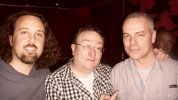 Dave Kerzner and Roger King both wondering how
to avoid yours truly,
Dave Kerzner and Roger King both wondering how
to avoid yours truly,
Genesis Revisited II launch party. |
Then there is Keith Emerson’s cameo Moog solo. Heather Findlay and David
Longdon’s guest vocals, the McBroom sisters, Colin Edwin of Porcupine
Tree, the backing vocalists of the Australian Pink Floyd, Jason Scheff, the
lead singer of the band Chicago and more. As I said, I could talk for days about
the wonderful musicians on the album. My co-pilot Fernando Perdomo certainly
deserves more than just a mention and a whole lot of praise for what he has
done. He really helped me flesh out the band sound of my solo albums by keeping
a certain consistency of style between my playing, his and Nick’s.
AH: If you could work with anybody who you haven’t worked with yet, who
would it be?
DK: I would love to work with Paul McCartney, Dave Gilmour or Roger Waters.
I’d also love to write and produce something with Tony Banks, Peter Gabriel,
Roger Hodgson and actually a long list of artists. But I am not as interested
in doing it in a small way just to be able to say I did it. I’ve got the
name-dropping resume already if that was what I was after. I’d rather
actually co-create something great with them. Something timeless that brings
out the things I and others love the most about their style. I ‘d want
to be in a situation where I’d truly have something to bring to the table
as a co-writer and/or co-producer. That in and of itself is more important than
who it is. It can be any of the above or none of the above. I’m content
to even just do my own music, especially now that I have decided to finally
sing my own songs. However, it is a thrill to work with your musical heroes
and especially if you are respected by them and compatible.
AH: How do you go about the writing process? Is it a few chords or notes that
turn into a song or is it a few words or a phrase that you develop music to
fit to?
DK: I usually start with the music as I was saying earlier. However, when certain
concepts or lines come to mind I will write them down or type them into my phone
or computer. Almost every song I write develops organically. Nothing is ever
forced and if it feels that way it quickly gets shelved until it can be revisited
with a fresh approach later on if at all. So, to me a great song flows into
existence and the writer is really a collaborator with something else that is
intangible. Some call it the “Muse” others call it “tuning
in” like an antenna to some collective consciousness. It really is a mystery
but I find that you have to reach for “it” to get a result you can
be truly proud of. #
AH: The album certainly has some strong prog influences : Pink Floyd, Genesis,
Yes etc. is this something you were aiming for or did it just progress that
way in your writing?
DK: While I am not shy about letting my influences show in my music the irony
is that I rarely ever, if at all, set out to write something that is meant to
be like any particular band or song. It just comes out that way because of the
deep-rooted impact their music has had on me over the years. It is all part
of the library of styles in my head and it only comes up sometimes for reference
after I have already started writing something. It might occur to me that a
Ringo style drum fill would be perfect for a song. Or a Gilmour-esque bluesy
guitar solo would “fit”. But everything is there to serve the song
first as opposed to the song serving some desire to copy a band I like. I think
that may be what makes it believable and authentic in the end. I realise that
I am sometimes very bold by treading waters so close to Pink Floyd or Genesis
or other prog icons. It opens the music up to potential criticism for that when
I could have just steered clear of it. However, if that is what the song suggests
it needs then it would be an artistic compromise not to let it be just what
it wants to be! So, I don’t avoid showing my strong influences just to
get out of potential criticism for it. I allow it, knowing that at the core
there is a genuine song that is fresh and unique. That’s what keeps it
from being second rate in my opinion. Everything else is icing on the cake and
to me there’s nothing wrong with a balance of familiar nostalgia and something
new and modern.
AH: How intense was the writing, recording and final production process?
DK: Ironically, making my album ended up being a bigger challenge than I thought
it would. After I parted was with Sound Of Contact, I thought it would be so
much smoother dong a solo album versus doing a band album because you no longer
have to convince anyone else to do something ordeal with band politics etc.
The flip side is that everything falls on you! I am picky so the amount of times
I have had to revise lyrics, record and re-record parts, mix and remix again
was brutal. But ultimately worth it for the final result which I am proud of.
It feels good to have done it and have it under my belt but it was quite intense.
I also learned a lot and I would like to think the next albums I do will be
that much easier because of what I have learned. However, I don’t mind
being challenged either and there is always some hurdle to jump along the way
to your destination.
AH: You have said that your album has a “cinematic” feel to it.
Would you like to do a film score one day?
DK: Yes, I would love to. I did some scoring for TV with Kevin Gilbert in the
1990’s. That was fun but my real love is great science fiction and quirky
dramatic films. I actually studied film a bit in college and the reason I switched
to music production was because it was something I could more easily control
and afford to do. I have actually written several stories for potential screenplays
and at some point I might get heavily into film. However, since I am really
into artistic quality above all else and I am picky I would like to be in the
position to work on a film, in any creative capacity that I can be truly proud
of as opposed to something that looks good on the surface or pays really well.
Don’t get me wrong, I like a gig that pays well! But if one can earn a
living creating things that you are truly proud of then they are even more successful
in my opinion. To enjoy what you do during your limited time here on Earth.
AH: Tell us about Mantra Vega and how you got involved with Heather Findlay.
And when is the album coming out?
DK: I was working on one of my Sonic Elements tribute albums and was
thing of adding a female voice to one of the tracks. My friend Kevin Pollack
had suggested Heather Findlay of Mostly Autumn. So I listened to her stuff and
really liked her voice sp I reached out to her o see if she would be interested.
We clicked right away and started talking about the idea of me producing some
tracks for her next solo album. We collaborated on a song called Island and
I sang a few parts really just to show her some words I had written for it and
she said: “You realise you have to sing on this with me, right?”
Our voices blended so well and it reminded us of Peter Gabriel and Kate Bush
whom we both like. Also Fleetwood Mac, Genesis, Led Zeppelin and Pink Floyd
are mutual influences and as that was coming through in other songs we worked
on until at one point she said something to me like “This really is a
mix of our styles. You want to make this just a band project?” and I asked
he if that was something she wanted to do. She said she actually missed being
in a band and since I had parted company from Sound Of Contact I kind of felt
like an orphan myself. All it took was getting together with Alex, Stuart, Chris
and David to realise this is something special and too cool an opportunity to
pass up. Granted everybody is superb busy and Mantra Vega is what we do in addition
to something else. I still have my solo band and Heather has hers with plans
to do another solo album with Troy Donockley of Nightwish at some point. David
plays with Roger Waters and has just released a new solo album. The other guys
still play with Mostly Autumn, but I think that’s great! We are lucky
to have this additional outlet to collaborate and enjoy performing together.
I call them my “UK Family” because we get on so well. A fun group
of people that I look forward to playing with in 2015.
AH: What’s next for Dave Kerzner?
DK: I’m wrapping up the deluxe edition of my album which is a two CD
set double the length of the main album. It’s a little crazy because at
140 minutes this is really like two double albums. I don’t know what got
into me! I had an urge to write new music and after the success of Dinensionaut
which I wrote a large amount of the songs for, I was ready to get to the next
album whether I was in the band or not. If I was still in Sound Of Contact then
some of these songs might have ended up being part of the follow up album. But
since I unexpectedly ended up on my own, it turned out to be even better in
so many way because I was able to expand the range of styles even further and
different people could be cast per song plus I could make all the final decisions
to keep a certain consistency so in retrospect everything turned out alright.
I think it is a shame that the band that made Dimensionaut will never do a follow
up together. But that is how it goes sometimes in the unstable music industry.
I am here now and I have big plans to eventually tour, explore other band opportunities
like Mantra Vega, make more solo albums and produce other artists. I also continue
to run my company Sonic Reality with long time friend and fellow keyboardist,
Erik Norlander. I am never without something productive to do and that suits
me because I admit I am a workaholic. I like to get things done and have something
to show for it as opposed to just talking about it. Life is short! A lot more
music to be made - I’m on a roll here!
Amen to that and out thanks to both David and Andrew for sharing this interview
with us here at TWR.

